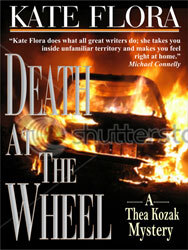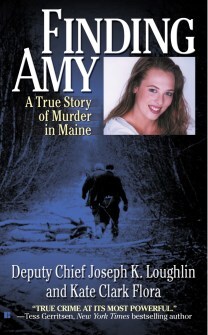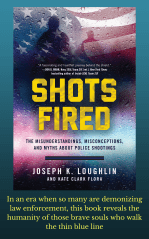When Are You Going to Write a Real Book?
 Kate Flora: When we’re not at our desks, writers spend a lot of time in bookstores and libraries talking about our books and the writing process. Over the years, there have been some questions that are on repeat and some that are real surprises. I think the topic of this post, when am I going to write a real book, might be the biggest surprise.
Kate Flora: When we’re not at our desks, writers spend a lot of time in bookstores and libraries talking about our books and the writing process. Over the years, there have been some questions that are on repeat and some that are real surprises. I think the topic of this post, when am I going to write a real book, might be the biggest surprise.
I tried not to snarl when the question was asked. (I think this one was in an email, not face-to-face.) Instead, I described my ten years in the unpublished writer’s corner, where I refined both my craft and my cover letter, to get where I am today. I said that I believe I DO write real books, books that explore the nature of evil, the development of character, the relationship between setting and story, that create the balance between solving the story arc in each individual book and continue to develop the character arc over the course of the series. I don’t know if the person who posed the question was satisfied. There are certainly many other there—writers and readers alike—who believe that only literary fiction has value and genre fiction does not.
These people are not happy when I say that “literary fiction” is merely another genre.
 One question that I’ve gotten with some frequency over the years was whether, given the tense relationship between Thea and her mother, Thea’s mother was based on my own mother. The first time it was asked, I was shocked. I said no, definitely not, that my mother was one of my heroes. The follow-up question was: then where does she come from? It’s always interesting to hear what readers focus on, isn’t it? Anyway, I pondered on the question and decided that much of Thea’s mother’s difficult character was a blend of my two grandmothers. One was a witch; the other, superficially sweet, was an accomplished manipulator who had to have her way.
One question that I’ve gotten with some frequency over the years was whether, given the tense relationship between Thea and her mother, Thea’s mother was based on my own mother. The first time it was asked, I was shocked. I said no, definitely not, that my mother was one of my heroes. The follow-up question was: then where does she come from? It’s always interesting to hear what readers focus on, isn’t it? Anyway, I pondered on the question and decided that much of Thea’s mother’s difficult character was a blend of my two grandmothers. One was a witch; the other, superficially sweet, was an accomplished manipulator who had to have her way.
A similar question was: Is Thea based on me? I said look. Am I nearly six feet tall, with wild, dark curly hair and an impressive chest? Am I as brave as a barrel full of bears? No, I said. I am the mother of two boys. I always wanted a daughter, and I expect, had I had one, she would have been as courageous and headstrong as Thea. There have definitely been times over the course of the books when she’s gone off to do something against my advice (our characters absolutely do that) and I worried until she was out of danger.
I was asked the “real book” question before I took that detour into writing nonfiction.  Sometimes I wonder whether the questioner would consider Finding Amy: A True Story of Murder in Maine, a real book. What about Death Dealer: How Cops and Cadaver Dogs Brought a Killer to Justice. And certainly my cowritten nonfiction about police shootings from the police point of view, Shots Fired, is a real book, even if it isn’t literary fiction. For those books, there are questions like whether my co-writer, Joe Loughlin, had a thing for Amy’s mother. And my all time favorite (NOT) from a question asked when I was speaking at the Unitarian church about Shots Fired. After explaining that the book was about actual experiences by police officers in tense shooting situations, and the consequent effects on them psychologically as well as on their careers, one woman said, “Wouldn’t the book be better if it included the black point of view?”
Sometimes I wonder whether the questioner would consider Finding Amy: A True Story of Murder in Maine, a real book. What about Death Dealer: How Cops and Cadaver Dogs Brought a Killer to Justice. And certainly my cowritten nonfiction about police shootings from the police point of view, Shots Fired, is a real book, even if it isn’t literary fiction. For those books, there are questions like whether my co-writer, Joe Loughlin, had a thing for Amy’s mother. And my all time favorite (NOT) from a question asked when I was speaking at the Unitarian church about Shots Fired. After explaining that the book was about actual experiences by police officers in tense shooting situations, and the consequent effects on them psychologically as well as on their careers, one woman said, “Wouldn’t the book be better if it included the black point of view?”
 One of those moments when I realized I had several great answers a few hours later. And she never did get that some of the officers involved in those shootings were black.
One of those moments when I realized I had several great answers a few hours later. And she never did get that some of the officers involved in those shootings were black.
There will always be great questions, weird questions, annoying questions, and questions that teach us about our writing. One of my favorites was the reader who asked, about one of my Joe Burgess police procedurals, what I expected my readers to take away from the book. Probably I should have, but I’d never thought of it before. I was wrapped up in storytelling, and craft, and character. But of course, when I look at any book, or look at the arc of a series, I can see a lot of questions woven throughout the narratives. At bottom, they are about the contest between good and evil and who will fight for good. And about the ripple impacts of crime not only on the victim but on the others around that victim.
Lea Wait's Blog
- Lea Wait's profile
- 507 followers



